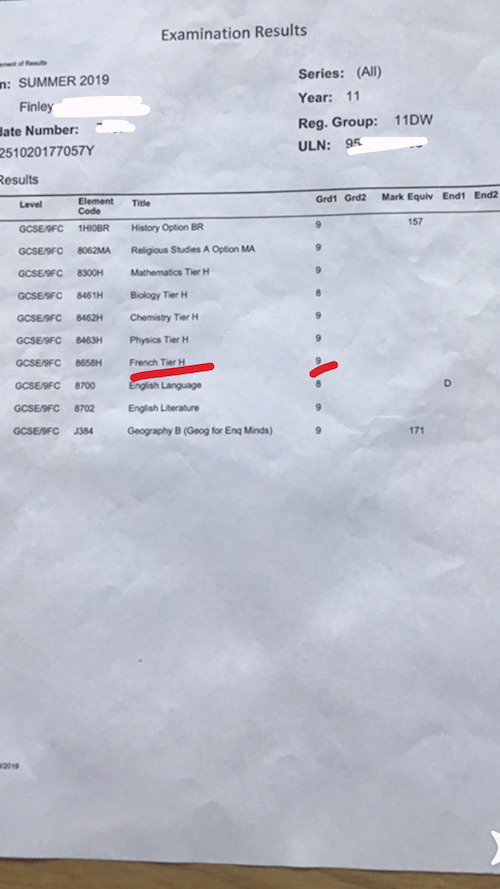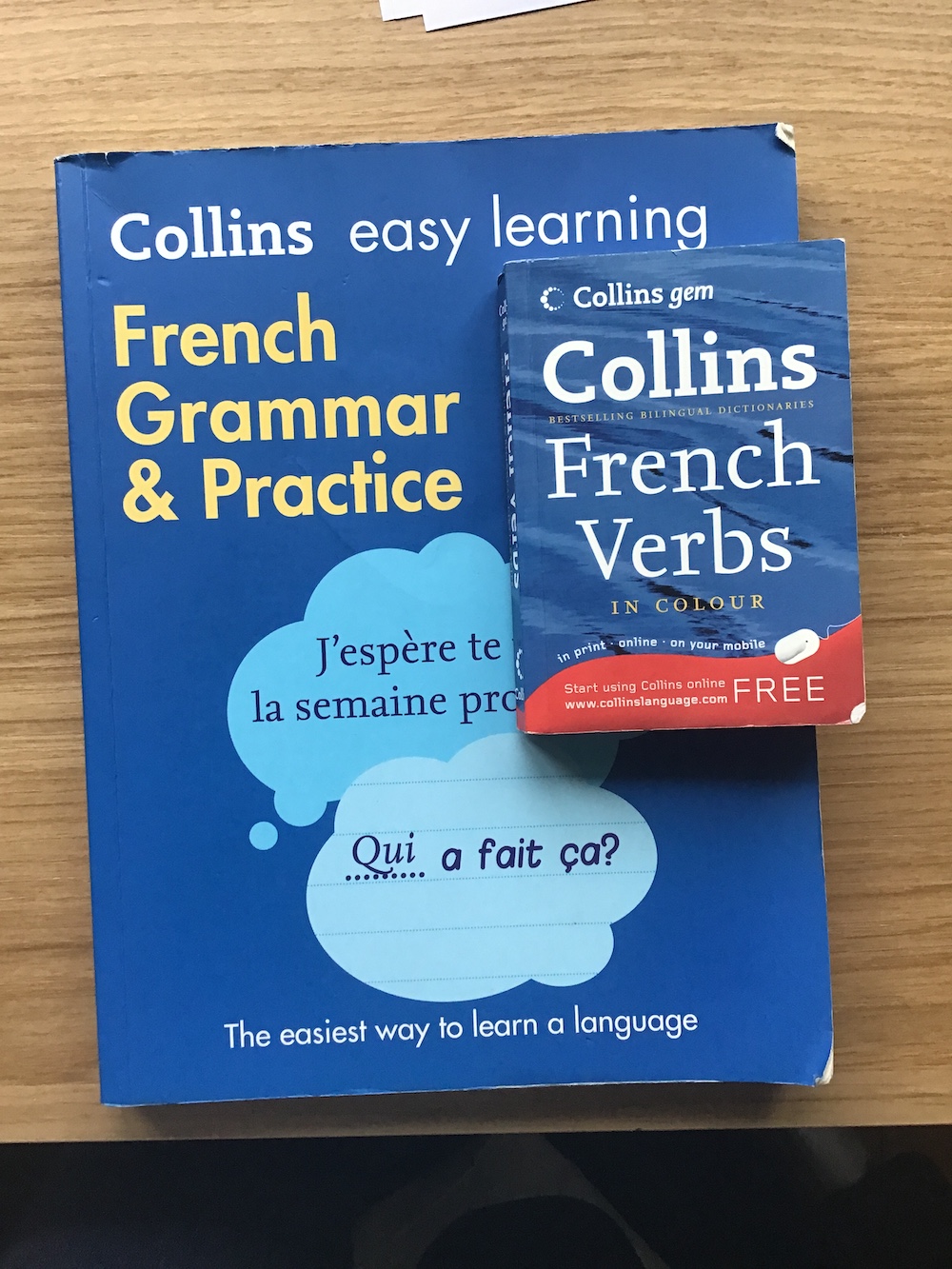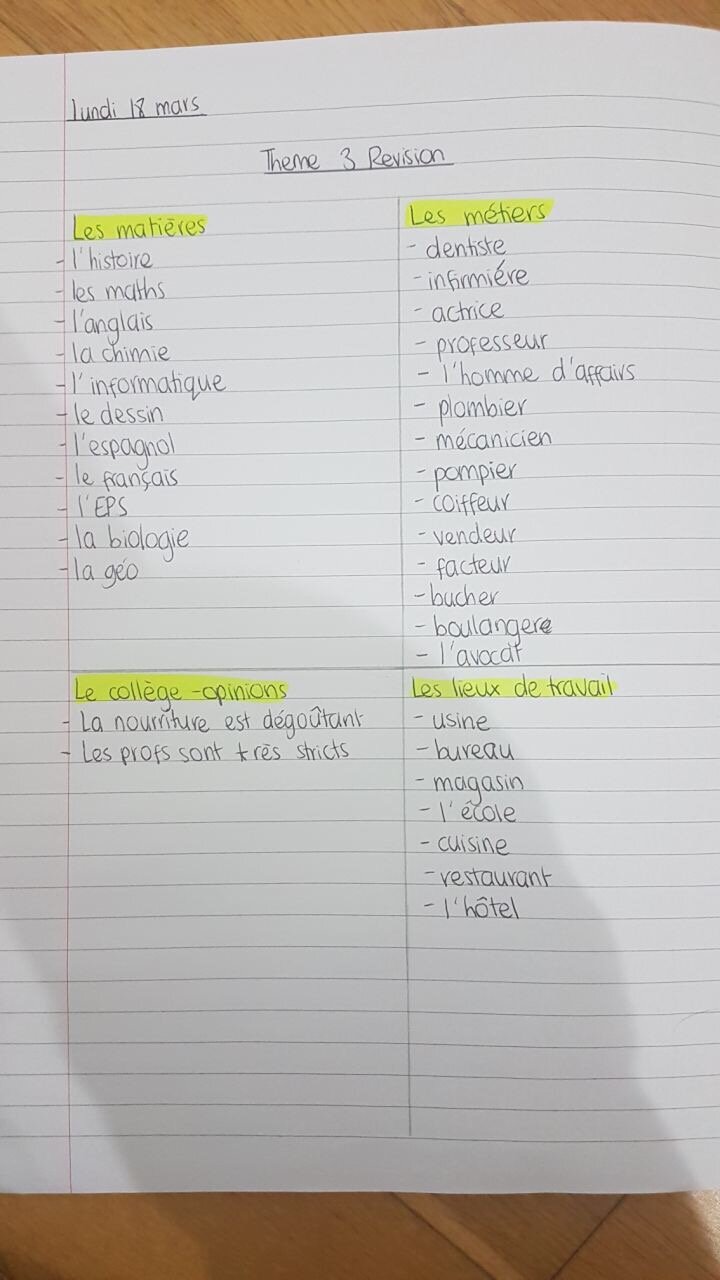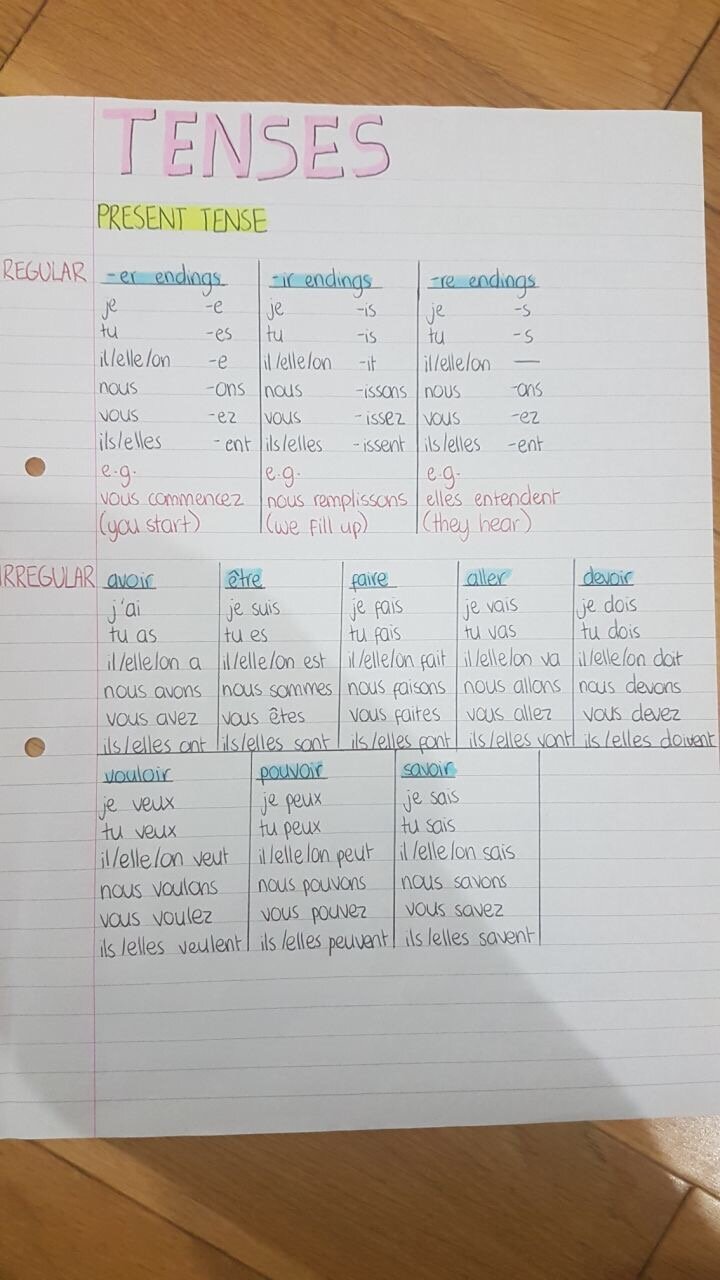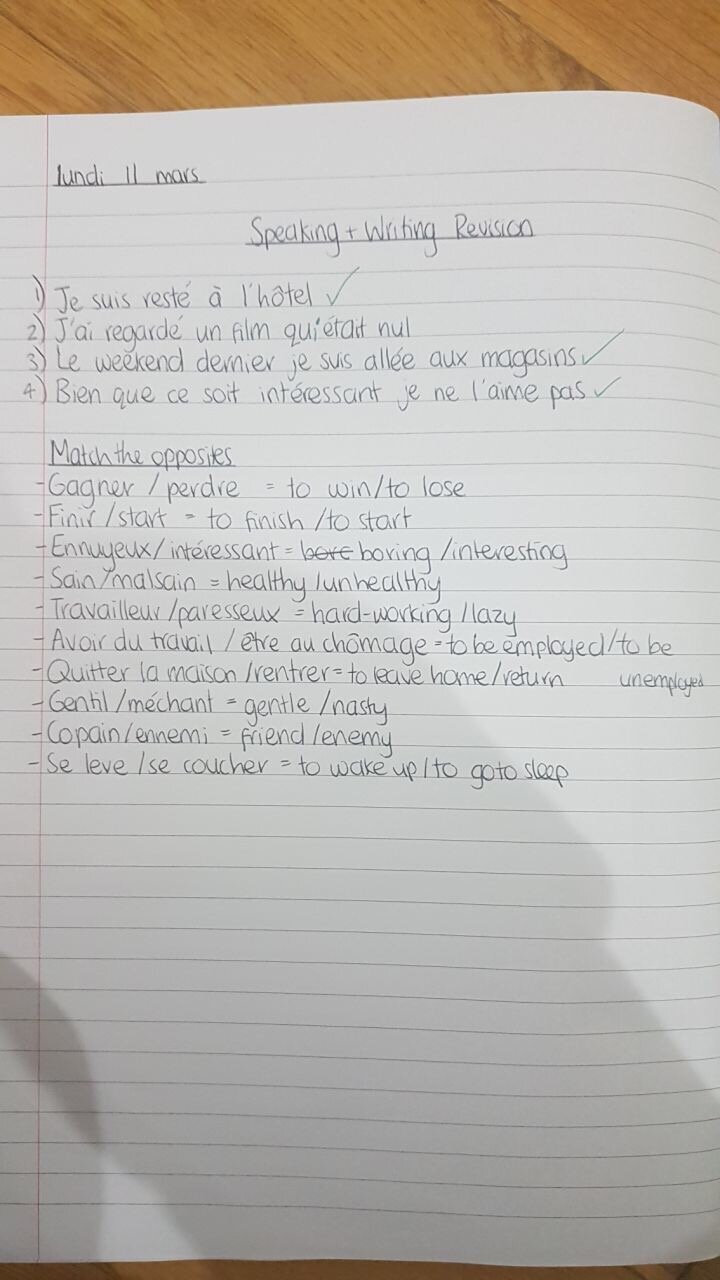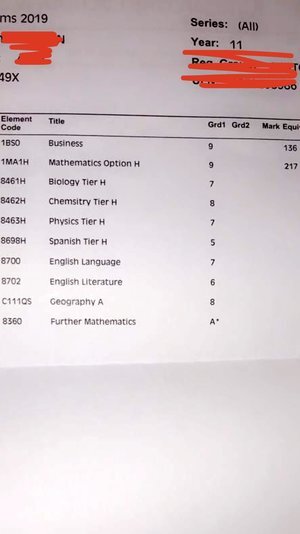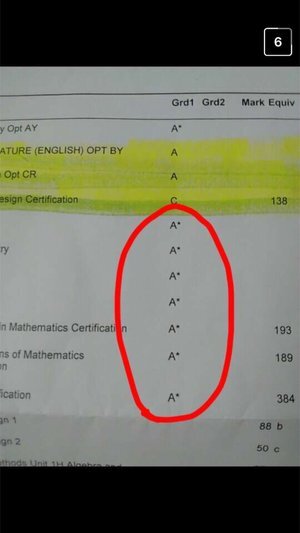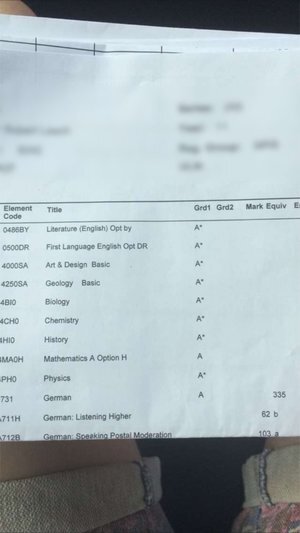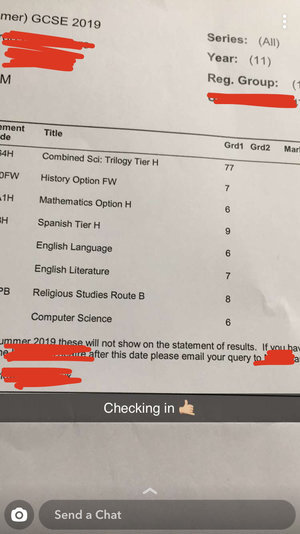French, or any other language for that matter, is usually one of those subjects people either connect with very easily on a linguistic level, or struggle to meet eye to eye with. For myself, I was lucky enough to connect with the language on such a level, as it gradually became one of my most favoured subjects. But connecting with a language isn’t one in a million; I attended an ordinary comprehensive school in the midlands and was taught by a fairly decent Modern Foreign Languages department. My view is that you’ve got to see it as a challenge you want to overcome in order to prove to yourself that you could communicate to others in their native language (if you had to). Then you are in a better position to develop a connection, and even a love for the language.
I did AQA GCSE French (specification here) and as it’s a language, most if not all of what I mention will be transferable to other exam boards. Generally speaking, topics relating to food, sport and free time activities are deemed the easiest, given the range of cognates (french words that are basically the same in English) included in these areas. I’d also say that when studying a language, people are inclined to learn about what they enjoy or what they would like to do, whether that be talking about holidays or becoming a professional footballer. My passion is football, and I’ve been playing Sunday league for over 10 years. I’d recommend that you can incorporate and frequently use your passions as ‘go to’ topics when studying French, this will inevitably make you more interested and therefore more likely to succeed.
The difficulties therefore include learning about niche areas which fail to grab your interest or just prove quite difficult when getting to grips with higher level vocabulary. For me, these were perhaps ‘social issue’ topics, dealing with homelessness and unemployment; these were two areas which contained some quite unusual vocab, and the difficulties were intensified by my lack of interest to learn about them.
By the way, I used The Exam Coach’s Online Exam Preparation Bootcamp to help me through my GCSE year. Now more than ever, students need all the help they can get, and this audio course would be my number one recommendation for you this year. You can also apply a huge 80% discount if you use the code: BOOTCAMP at the checkout after reading my post (available for a limited time only).
Classwork
I thoroughly enjoyed my French class, even if I must admit that the double lessons dragged. In terms of approaching each lesson, I would make sure that I had my pen in my hand ready to make notes, even the Teacher hadn’t instructed to do so. This is a key thing; to succeed in languages, you can’t let a small grammar point slip, or just ignore the correct spelling of certain vocabulary, as you ‘can’t be bothered’ or because nobody else is writing anything down. You have to be the one responsible for making sure you’re up to date with everything going in class and your specification; if you’re out of the loop, then your grades will take a dip. Also, make sure you are tracking what you’re learning.
Has the teacher covered this part of the course?
Have you written notes down for that part?
Have you received the key vocab for this section of the spec?
Make sure you’re the one in control; you know what you’re doing next lesson and you know what to work on. Having this mentality will make you more likely to succeed.
And one last thing, ASK QUESTIONS. Whether in front of everyone or privately, asking questions will only lead to clarity on things you need, helping you better yourself as a language student.
The Revision
Now let’s get to business. French revision, I would argue, can be the most difficult subject to revise for, given that you need to revise: Speaking, Listening , Reading and Writing. And therefore, your revision should be broken up into four distinct parts.
Speaking: My approach for the speaking exam was simple: practice, practice and practice. Depending on your school, you should be provided with Speaking Booklets which give you GCSE practice questions. Many students write down answers and attempt to learn these answers by heart, hoping the questions come up in the exam. This is just impractical. Factoring in how many topic questions there could be, you will have to remember hundreds of sentences if you use that method.
My advice, and what I did, is to learn key phrases and vocab, and have in mind a few ideas you want to talk about if that topic comes up. For example, if in the exam the topic of leisure activities comes up, I will know that I will mention something along the lines of playing football or going out with friends. Having a rough idea for every topic area will only boost your confidence and fluency going into the exam.
Top tip: Always include opinions (eg c’etait très fantastique ) and don’t be afraid to ask the examiner a question back! A question you can ask the examiner nearly every time after giving your answer: “Mais, quel est votre/ton avis?” (But what is your opinion?)
Listening: A few weeks before the listening exam I would, every night before bed, listen to a French podcast on YouTube (intermediate level) that I could relatively understand. Even if I was completely lost, I would become accustomed to common phrases and pick up on words that I would have never heard before. AQA also provide past listening papers which I used in the lead up to the exam.
Reading: To revise for reading, I used the AQA GCSE CGP French book, which provided me with a variety of reading passages and questions, followed with answers at the back. This method of using revision guides proves most effective for developing my reading skills. Other ways include past paper reading passages, or even, on occasion, I’d read some articles on a French news website.
This is the kind of mind map I’d create for each key topic in the syllabus. I’d break each one down into verbs, key vocab, opinion phrases + adjectives and problems + solutions. In this way I could piece together different types of sentences which I could use in any type of French exam. I used a bit of colour to help chunk the information up and organise my thinking.
Writing: Like Speaking, you just have to practice. Experiment with new phrases, try mastering new grammar techniques that can wow the examiners (the subjective being a go-to method to getting a top grade).
My experience is that I’d find writing questions online, complete them and then hand them into my French teacher. After receiving feedback, I would go home and adjust or just complete a new piece from a different question, applying new techniques each time.
Top Tip: here is a commonly used starter, including the subjunctive: “Autant que je sache, la metéo..( As far as I know the weather.) Most subjunctives form after the word “Que”, so keep an eye out!
Don’t over do it though! A couple of hours a week on French from the start of school in September can pay big dividends come exam day.
Here’s an example of revising sentences I could potentially slot into any writing paragraph. Below that I’d list handy vocab, the ‘matching of opposites’ is a great technique to easily double the amount of words you know.
The Exam
For the French exams as a whole, the main strengths I think I had were those of concentration and determination. Before going into the exam, I was focussed on the format of the exam itself, knowing what I would need to do when I was in there, and when faced with a difficulty during the exam, knowing that I had to battle through and complete everything to my best ability, even if at first glance I didn’t have an idea.
Perhaps my weaknesses were overthinking and possibly rushing. When in the reading exam, it is very easy to skim read and miss out on information relating to the correct answer, but don’t be afraid to take your time and redo the question later.
My recommendation would be to do the translation on the reading and writing FIRST. The task should only take around 5 minutes on AQA with 9 to 16 marks on offer, doing this first may settle you down into a confident working rhythm in the exam as you’ll know you’ve covered the section with the most marks available early.
In the exams I took, a wide variety of topics came up (eg. Holidays, healthy eating and the environment); the exam can throw any topics your way, and it’s not a wise thing to predict potential topics, especially for languages.
Here’s a link to the GCSE French AQA past paper resources, in case you’re interested.
Summary
Overall, practice with languages is the perfect way to prepare. But there are particular areas to target which will undoubtedly boost your performance when compared to your peers.
Grammar
Mastering the grammar is a MUST for attaining the highest grades. Knowing the different verb conjugations and different endings relating to different pronouns and tenses opens up a whole new perspective for dealing with French. Start off with present, move onto perfect, then onto future, imperfect and if you’re feeling really in the mood, try and learn the pluperfect and subjunctive.
Vocabulary
Another thing is vocabulary. Not knowing vocab shuts off the potential you have to achieve highly. At the end of the day, knowing vocabulary is a memory game, and as The Exam Coach has advised before, active recall is the best way. Use Quizlet or Memrise to make sure you’re going over all the key words, and if you are competent with grammar and tenses, then French will soon become the subject for you.
Thanks for reading. 😄
Want some more help from The Exam Coach this year?
Online Exam Preparation Bootcamp
Learn how to prepare for your GCSE and A Level exams like the top performing students in the UK 🇬🇧
Improve your grades by one and a half grade boundaries (on average).
This audio programme will make you:
More disciplined
More motivated
Revise faster and better
For a limited time only, we’re offering you an 80% discount on this course!
Enter discount code BOOTCAMP at the checkout (available for a limited time only). Take a look and find out more about the Online Exam Preparation Bootcamp by clicking the button below.

